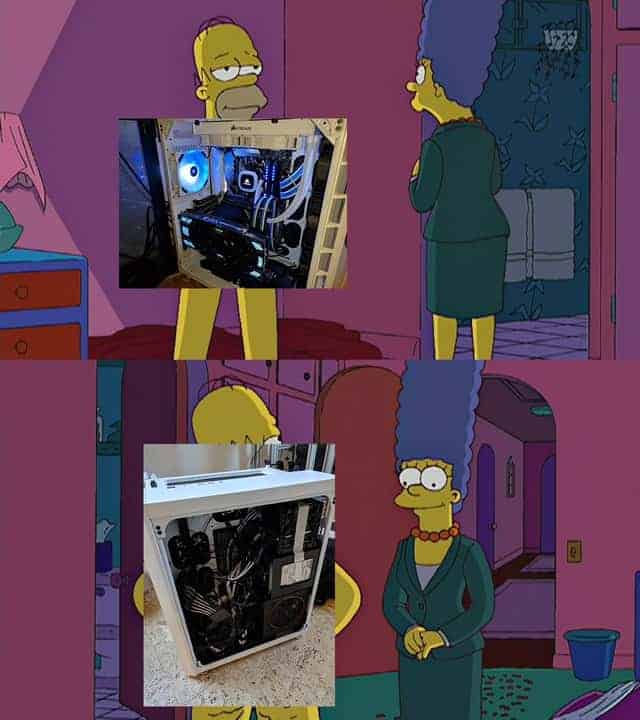For someone like me who works with computers nearly daily, questioning the power supply wattage and rating is kind of second nature. At a certain point, a tech can just kind of take a guess at what rating and wattage a certain machine may need. For new PC builders, terms like wattage, megahertz, and gigabytes can be quite confusing. Today, I’d like to specify exactly which power supply wattage you will need. Similarly, I will cover brands and ratings as well! Let’s dive in.
Why Power Supply Wattage Matters
I recently received a call from a customer the other day with what he described as being a “being question”… and to be quite honest, the question was much better from the typical “I’m being hacked” or “My computer is broken, fix it” conversation. He said, “I’m just about done obtaining the parts for my machine. The last I need is the power supply. PC Part Picker says it will use about 4XX Watts of power. If I go above that, will it fry my machine?”
What a great question! Like I mentioned before, new PC builders can find terms like wattage, megahertz, and gigabytes confusing. So it was a nice change of pace to answer an honest question, knowing full well I was speaking with someone who really wanted to make sure everything was in tip top shape. I could tell he cared about his machine. Good for him!
Answering The Question: No, a power supply with wattage above what your machine pulls will not fry your machine. The power supply wattage simply refers to its limit. Think if it like the weight it carries on its shoulders, while running a 5k… too much weight and it will not make it past the finish line. There are also ratings called 80 Plus Certifications. These range from White to Titanium, but we’ll talk about that here in a second. For now, lets take a closer look into which power supply is right for you.
What Power Supply Should I Get?
Wattage
Depending on the type of machine you are building, most of the time a 430W PSU is a sweet spot for a decent workstation and/or light gaming machine. Actually, here at Computer PRO, we use 250W PSU’s in our Essential Build series. These can power any CPU we throw at it, ranging from 10th Gen Celerons to 1oth Gen Core i7’s. Pretty crazy to think that’s all it needs, but it’s most thanks to lower TDP’s of the newer chips. If you’d like to get your hands on a new PC, give us a call and ask about our Essential Series. They start as low as $479 (without Windows)!
I always recommend running your machine list through a wattage calculator to get a rough estimate of the wattage you will be pulling. NewEgg makes a pretty fantastic Power Supply Wattage Calculator! I also recommended going up to the next tier of PSU Wattage when building something you plan on upgrading in the future. This helps future proof your machine, in case you get a shiny 3090 (sike) that eats more wattage than your entire build combined.
As a side note, please do not try to get the closest matching wattage to your pull. This will result in (A) many… many random shut-downs and (B) a waste of time and money. Do yourself a favor and make sure you give the wattage some leeway. The calculator are not precise and cannot know for sure what the max pull will be. There will be times that the wattage spikes. You can quote me on it!
Rating
The rating that power supplies go by is the 80 PLUS Certification. Ranging from 80 PLUS White to 80 Plus Titanium. If you’re a mid/heavy gamer, or someone in the CAD/CGI career field, Gold to Titanium would be your range. Titanium would be for machines that require the up-most precision and proficiency, (i.e. – CAD machines and servers). For anyone else, like those who only need a machine for school, light workloads, and even light gaming, White works perfectly fine.
Going back to our runner analogy, think of the rating like the amount of running our runner is used to, Titanium being our runner does a 5k every weekend, while White barely leaves the house. It’s goofy, but it makes sense… heh… right?

Brand, Price, and Aesthetics
This is completely up to you on which brand you choose. I personally really like EVGA, SeaSonic, and Corsair. I’ve used them for every one of my personal builds and my friends builds. We use SeaSonic, EVGA, and PowerMan here at CPROU. The biggest difference between these are price and aesthetics.
If you’re like me, I keep everything aesthetically pleasing to the eye. Keeping things a similar color is a must. It also depends on your case, because some cases require smaller PSU’s, while some cases have free reign and lots of room. Some cases also hide their PSU’s while others are in plain sight. These are all things to consider when choosing.
Each brand makes a wide variety of power supplies. Ranging anywhere from 400W to 1200W+, they have an option for you. One major factor on both price and aesthetics is modular vs. non-modular vs. semi-modular. The difference being that fully modular PSU’s are their own separate entity from the cables/wires. Semi-modular has the 24-Pin and ATX CPU pins soldered into the PSU, while the peripherals and PCI-E cables are pluggable. Non-Modular PSU’s have each cable completely soldered to the PSU, leaving you with every cable, (even the ones you don’t need). Check it out down below.

In Closing
There are many factors that go into choosing your PSU. The biggest thing to be cautious of is the Power Supply Wattage. Making sure you machine has enough juice to get through the day should always trump aesthetic. Although the gap between them all is closing. But hopefully you guys can now see the biggest differences between all of the PSU types. PSU’s already look pretty slick as is, so you really can’t go wrong there. But it does help to only need to plug in the cables you need! I have an EVGA 80 Plus Gold 1000W GQ (fully modular), and I love it! Newer PSU’s come with hybrid fan modes, so they only kick on when they need to. SeaSonic has a fanless PSU now too!
Hope ya’ll gathered some useful info. Here’s a meme that (sort of) has something to do with today’s post. I guess I’ll caption it.. “Me when I buy a non-modular power supply”.


Eagle Scout of Troop 48
AAS: Criminals Justice; Law Enforcement Graduate
IT Technician, Web Designer for Computer PRO Unltd.
Student at the Eastern Missouri Police Academy
